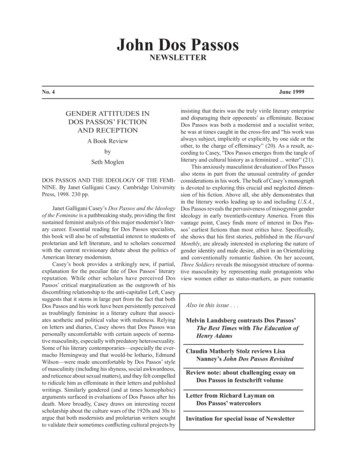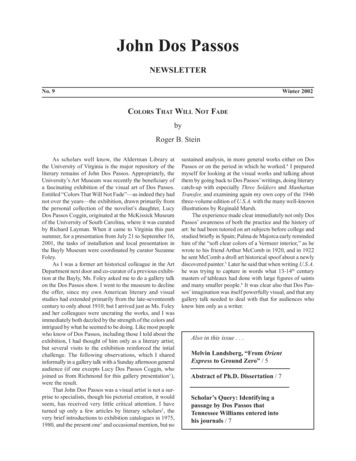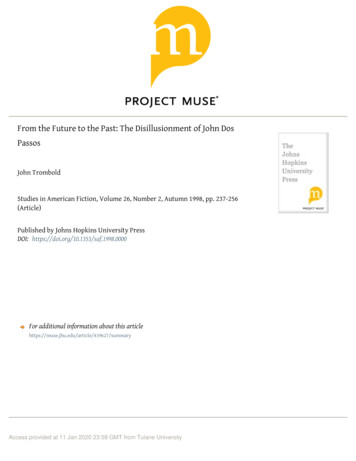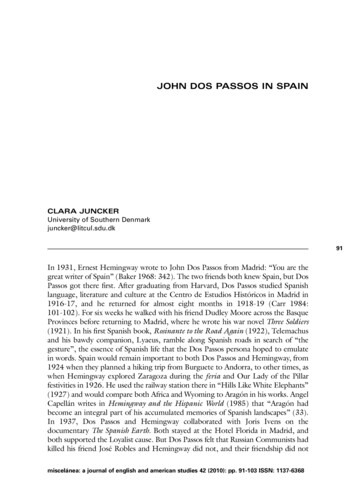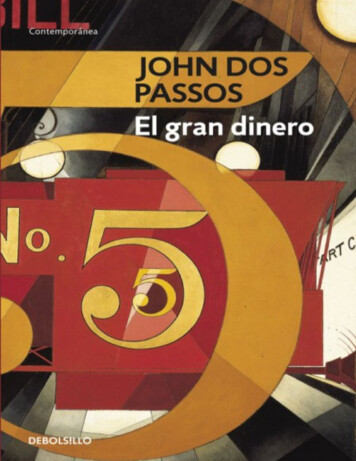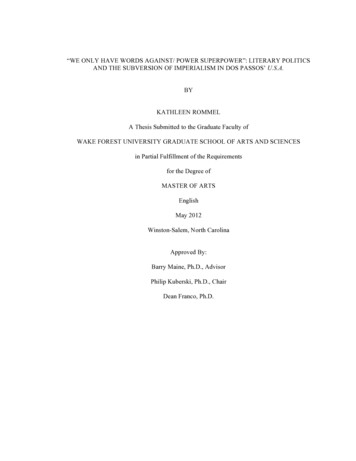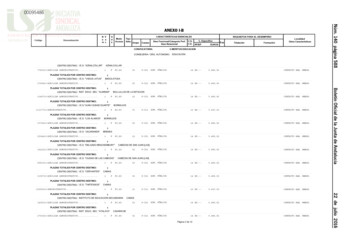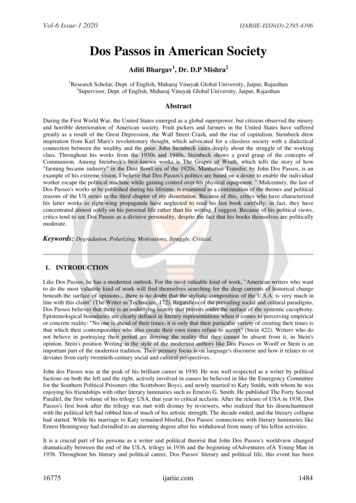
Transcription
Vol-6 Issue-1 2020IJARIIE-ISSN(O)-2395-4396Dos Passos in American SocietyAditi Bhargav1, Dr. D.P Mishra21Research Scholar, Dept. of English, Maharaj Vinayak Global University, Jaipur, Rajasthan2Supervisor, Dept. of English, Maharaj Vinayak Global University, Jaipur, RajasthanAbstractDuring the First World War, the United States emerged as a global superpower, but citizens observed the miseryand horrible deterioration of American society. Fruit pickers and farmers in the United States have sufferedgreatly as a result of the Great Depression, the Wall Street Crash, and the rise of capitalism. Steinbeck drewinspiration from Karl Marx's revolutionary thought, which advocated for a classless society with a dialecticalconnection between the wealthy and the poor. John Steinbeck cares deeply about the struggle of the workingclass. Throughout his works from the 1930s and 1940s, Steinbeck shows a good grasp of the concepts ofCommunism. Among Steinbeck's best-known works is The Grapes of Wrath, which tells the story of how"farming became industry" in the Dust Bowl era of the 1920s. Manhattan Transfer, by John Dos Passos, is anexample of his extreme vision. I believe that Dos Passos's politics are based on a desire to enable the individualworker escape the political machine while gaining control over his physical equipment. " Midcentury, the last ofDos Passos's works to be published during his lifetime, is examined as a continuation of the themes and politicalreasons of the US series in the third chapter of my dissertation. Because of this, critics who have characterizedhis latter works as right-wing propaganda have neglected to read his last book carefully; in fact, they haveconcentrated almost solely on his personal life rather than his writing, I suggest. Because of his political views,critics tend to see Dos Passos as a divisive personality, despite the fact that his books themselves are politicallymoderate.Keywords: Degradation, Polarizing, Motivations, Struggle, Critical.1. INTRODUCTIONLike Dos Passos, he has a modernist outlook. For the most valuable kind of work, "American writers who wantto do the most valuable kind of work will find themselves searching for the deep currents of historical changebeneath the surface of opinions. there is no doubt that the stylistic composition of the U.S.A. is very much inline with this claim" (The Writer as Technician, 172). Regardless of the prevailing social and cultural paradigms,Dos Passos believes that there is an underlying history that persists under the surface of the systemic cacophony.Epistemological boundaries are clearly defined in literary representations when it comes to perceiving empiricalor concrete reality: "No one is ahead of their times; it is only that their particular variety of creating their times isthat which their contemporaries who also create their own times refuse to accept" (Stein 422). Writers who donot believe in portraying their period are denying the reality that they cannot be absent from it, in Stein'sopinion. Stein's position Writing in the style of the modernist authors like Dos Passos or Woolf or Stein is animportant part of the modernist tradition. Their primary focus is on language's discourse and how it relates to ordeviates from early twentieth-century social and cultural perspectives.John dos Passos was at the peak of his brilliant career in 1930. He was well-respected as a writer by politicalfactions on both the left and the right, actively involved in causes he believed in like the Emergency Committeefor the Southern Political Prisoners (the Scottsboro Boys), and newly married to Katy Smith, with whom he wasenjoying his friendships with other literary luminaries such as Ernesto G. Smith. He published The Forty SecondParallel, the first volume of his trilogy USA, that year to critical acclaim. After the release of USA in 1938, DosPassos's first book after the trilogy was met with dismay by reviewers, who realized that his disenchantmentwith the political left had robbed him of much of his artistic strength. The decade ended, and the literary collapsehad started. While his marriage to Katy remained blissful, Dos Passos' connections with literary luminaries likeErnest Hemingway had dwindled to an alarming degree after his withdrawal from many of his leftist activities.It is a crucial part of his persona as a writer and political theorist that John Dos Passos's worldview changeddramatically between the end of the US.A. trilogy in 1936 and the beginning ofAdventures ofA Young Man in1938. Throughout his literary and political career, Dos Passos' literary and political life, this event has been16775ijariie.com1484
Vol-6 Issue-1 2020IJARIIE-ISSN(O)-2395-4396acknowledged as the most critical turning point. Dos Passos' political reversal is examined in light of hiscontemporaneous reformulation of the relative imaginative power of the past and future, which is examined inthis essay. Critics have noted Dos Passos' shift away from revolutionary futurism and toward a nostalgichistoricism, but they have not paid enough attention to his simultaneous rejection of one and embracing of theother. At all times, Dos Passos' political ideas were thoroughly incorporated with his literary attitude. Afterdiscovering that the Communists in Spain had attempted to hide the killing of poet José Robles, Dos Passosbroke with the political left and began writing novels with a more conventional narrative style and a strongnationalist bent. He also began researching Spanish history. After the Spanish Civil War in 1937, he turned hisback on Europe and the modernism that had previously inspired his work. A more traditional narrative orderappealed to Dos Passos since he had previously used the tactics of Italian futurism, Russian futurism, andRussian constructivism in addition to poetic techniques of simultaneism.2. MECHANICAL STATE IN THE U.S.A. TRILOGYDos Passos is difficult to classify as a political writer since he does not support any one political system, yet hisbooks are certainly politicized, but for what purpose exactly? If Dos Passos does not believe in any other systemof thinking, what is the fundamental flaw of capitalism that he is screaming against in his books? What is DosPassos trying to convey? Why does he do this? In what way does the United States function as a trilogy? Onemust begin by returning to Sacco and Vanzetti and Do Passos' inspiration for composing the trilogy. ' In DosPassos' summary of the case for the New Masses in 1926, he imagined that Sacco and Vanzetti came to theUnited States in hopes of living in free communities of artisans and farmers and fishermen and cattlebreederswho would work for their livelihood with pleasure, because the work was itself enjoyable in the serene whitelight of a reasonable world' (MNP 90-91). Sacco and Vanzetti lived in an urban setting, and Vanzetti evenworked in a factory, thus the pastoral character of Dos Passos's utopian ideal seems rather strange. In any case, itseems to be more Dos Passos's vision than that of the Italian immigrants, who may have seen the United Statesas a site where such communities might be established, although it is not apparent whether that is the case. At nopoint do Sacco and Vanzetti indicate urban living is a problem, despite their stated desire to improve workingclass lives and destroy capitalism.However, Dos Passos often makes the idea. When he wrote his play Airways, Inc. for the New PlaywrightsTheater before beginning work on the USA trilogy, it was less about socialism and more about the perils ofcontemporary existence in an industrial environment (despite the political motivations of the New Playwrights).The drama chronicles the lives of the Turner family as they struggle to find their place in a tiny, unnamedAmerican town that serves as a microcosm of the rest of the nation. According to Dos Passos, the play was aneffort to develop'socially creative ideas,' the new myth that must be constructed to replace the imperialistprosperity myth in order to have the machinery of American life ever under social control (qtd. in Aaron 348349). As a result of the criticism of modern technology in Dos Passos's play, critic Edmund Wilson said that theplay made him want 'to rush to defend even the American bathroom, and even the Ford car'—which in fact, onebegins to reflect, have perhaps done as much to save people from the helplessness. as all the prophets ofrevolutionî (34). Wilson contends that Airways, Inc., connected machinery and a drive to produce with moralinadequacy and a tendency to exploit other human beings. It was not simply physical risk that Dos Passos saw incontemporary technology, but also mental, emotional, and spiritual harm. Dos Passos, for example, wassurprised by the lack of outrage after the Ohio prison fire of 1930 and blamed contemporary technology fordiminishing the capacity of Americans to feel empathy. Following World War I, he observed, 'the fastautomation of life has utterly blunted the creative reaction that is physiologically rooted in sensations of pity andcompassion'" (MNP 131).When Dos Passos was still at Harvard, he began warning others about the perils of science and the steel-girdedgoddess, with her halo of factory smoke and her buzzing chariot wheels of industry, leading the parade of humanthinking which follows so tamely in her trailî (qtd. in Pizer 31). He claims that science has created a"irrelevance-clutter" that has kept the arts from flourishing, and that it has done so at the expense of thehumanities and the arts of creation (33). Dos Passos was troubled by the machine's literal and metaphoricalqualities. As many contemporary directors do, he imagines robots as sentient entities who strive to annihilatehumans at times. To him, the novel Erewhon by Samuel Butler was intriguing for several reasons, chief amongthem the chapter titled 'The Book of the Machine,' in which the author describes how the people of Erewhonbanned all complex machinery for fear that it would one day become conscious and enslave the human race. îAccording to Dos Passos, there is a deep thinking in this idea.î (33-34). There is a similar notion in Airways,Inc., when Professor ponders, "In a million men's hearts, the thinking develops, in a million machines' hearts, thewill is there" (73).16775ijariie.com1485
Vol-6 Issue-1 2020IJARIIE-ISSN(O)-2395-4396In The Big Money, Dos Passos also pays tribute to the Wright brothers. When it comes to taking off from KillDevil Hill and playing "Diabolo in the Tuileries gardens," the book has an apocalyptic tone. Wright brothers "donot appear like they were very much impressed by upholstery and braid and the gold awards and procession ofplush horses,/ they remained practical mechanics," Dos Passos writes in his last paragraph (BM 225). Theperfect artisan, in Dos Passos' view, is the innovator who keeps focused on his task and is not distracted by fame,recognition, or the prospect of financial gain. The achievement of one's idea may stay unspoiled by its futureapplications if one's intentions are in the correct place. While Dos Passos despises the Wright brothers' machine,he also admires their achievement, and this appears to be especially true of the brothers.Like Airways Inc., air travel in the United States has a risky, even reckless quality. The trilogy contains threeflight-related deaths, none of which result from air combat and all of which feature a circumstance that heightensthe risk of the flight; Buddy Trent's plane was not properly maintained, Bill Cermack and Charley Andersoncrashed on a test flight, and Daughter finds her flight spinning out of control after climbing into the cockpit witha drunk driver. Final biography of a vagabond features the novel's most famous picture of an aircraft. Suddenly,the story shifts from the vagabond trying to walk and hitchhike a 'hundred miles down the road,' to thebusinessman flying above. Although the transcontinental passenger covers a lot of ground, unlike the vagrant,the business traveler is just passing through and does not have a chance to see or experience the nation. Whilethe vagabond has slept 'near frozen beartracks in the Yellowstone,' the traveler can only detect a faint scent ofsweetgrass above Cheyenne.3. SOCIALISTIC VISIONWhen Dos Passos wrote in his piece "America and the Pursuit of Happiness" in the Nation, he voiced hisconcern for individual liberty: "We must halt the economic battle, the fight for the survival of man against man"(778). Author John Steinbeck was awarded the Pulitzer Prize for his novel The Grapes of Wrath (1939), whichdepicts the hardships endured by small-town American farmers and calls for more social responsibility. Thebook is a social protest novel since the author focuses on capitalism's negative impacts. Steinbeck used hisempathy and moral concern to represent the condition of the outsiders, the alienated, the vanquished, and thedowntrodden working class in his writing. Because of his sympathy for the fruit pickers and farmers in TheGrapes of Wrath, Steinbeck was awarded a Nobel Prize for Literature in 2010. A fierce assault was launched bySteinbeck against the capitalist dogma that promoted profiteering, exploitation, and materialistic desires againstthe merchants and bankers. The Joad family is the focus of The Grapes of Wrath. Ma and Pa Joad and their sixchildren form the basis of the family. Revolutionary book The Grapes of Wrath challenges the American literaryculture, which has never portrayed the working class, in Steinbeck's groundbreaking novel. In AmericanWorking-Class Literature: An Anthology (2007), Nicholas Coles and Janet Zandy emphasized the novel'srevolutionary character. The narrative of The Grapes of Wrath depicts the history and lifestyles of white sharecropping farmers in Oklahoma who have been uprooted and dispossessed. Taking up this issue, Steinbeck used asimple, colloquial, and poignant approach to express the struggle of the proletariat. A spokesperson for the"American Underclass" or "those stranded at the bottom" became his calling card. Steinbeck takes aim at theagricultural machinery that holds farmers captive.I could not tell whether the figure on the iron chair was male or female. He was more attached to the bank thanthe property. Without desire, he could appreciate the orgasms set by gears and record them carefully (JohnSteinbeck, The Grapes of Wrath 48). Classic narrative of American proletariat's fight against nature and harshbusiness community is depicted in The Grapes of Wrath. By making fun of the greedy capitalists who takeadvantage of the impoverished farmers and the poor, Steinbeck exposes and mocks their callousness andinhumanity on a grand scale. With its sad narrative and a call to action against America's capitalist system, thiswork is a protest novel with a message that is both universal and personal. Farms have been taken over by thebanks and the major landowners, forcing hundreds of thousands of small farmers; share croppers, off of theirland. It is in the same vein as Dos Passos' trilogy U.S.A. and Uncle Tom's Cabin, but with more intensity andgrandeur than the latter two. An epic of pain, the book chronicles the rural hardships of the author's family.Three generations of the same family were compelled to relocate to an unknown location. Death, abandonment,and starvation all feature prominently in the narrative. It is true, however, that The Grapes of Wrath is a study ofrural society. His portrayal of socioeconomic situations is striking, and Gorky and Lucas describe the story asone of "social realism."Obviously, John Steinbeck has used the power of fiction in an uncompromising way for the betterment ofmankind throughout his works. In his novel The Grapes of Wrath, Steinbeck held up a mirror to his own placeand times. Unlike Zola and Dos Passos, this work is concerned with the plight of the farmers, and its themes andtone are reminiscent of ancient literature. Steinbeck was "exhausted" when he completed the book in 1938,16775ijariie.com1486
Vol-6 Issue-1 2020IJARIIE-ISSN(O)-2395-4396according to Jacobson, and the physicians recommended him to rest completely. Despite the fact that the bookwas released as a "document" rather than a novel, it is important to point out that this is not the case now. "TheGrapes of Wrath is a novel where in naturalism has gone berserk, where truth has run amuck drunken uponprejudice and exaggeration, where matters economic have been hurled beyond the pale of rational and realisticthinking," wrote George Thomas Miron in The Truth About John Steinbeck and the Migrants (1939). (5).migrant workers' voyage may be traced back to the exodus of the Israelites from Egypt in the Bible, whichSteinbeck has written thirty chapters on.It begins with a gloomy tone, then the protagonist appears like he emerges from jail in Manhattan Transfer byDos Passos. Tom learns that his family is residing with his uncle, ten miles away, and that they are also ready torelocate. Only Muley Gravis remains in hiding from Sheriff's men in this whole rural village. In an empty home,he stalks the hallways "like an old cemetery spirit." The next morning, Tom's uncle and the rest of the family aregetting ready to leave the property, as per the instructions of the Sheriff. The eviction of the farm fromSteinbeck's novel is presented in a heart-wrenching manner. Because "women and children understood deep inthemselves that no sorrow was too big to endure if their husbands were whole," the ladies are portrayedobserving their men (7). The family seems to be in a state of confusion and bewilderment as they are engulfed incommotion. Ma Joad is shown by Steinbeck as a fearless warrior, a lady of incredible bravery and spirit.As a response to the anxieties of the American people about urbanization and technology, Dos Passos releasedhis book Manhattan Transfer (1925). As Sinclair Lewis (1925) put it: "Dos Passos could be the founder ofhumanized and alive fiction. Even the big white boar Mr. Joyce's Ulysses could not compare to ManhattanTransfer for Lewis in terms of literary quality (Saturday Review 361). Its "breathless realism" was praised by thereviewers, and Dos Passos was praised for his ability to portray the plight of middle-class Americans whomoved to big cities like New York in quest of better lives and better employment. In its flashes, cuts, and speed,Dos Passos used cinematic methods. It has been said that Dos Passos is indebted to avant-garde art and the filmsand theater of Eisenstein. Two hundred episodes of the novel's storyline revolve around half a dozen persons,illustrating the novel's topic of societal and cultural emptiness. Throughout the narrative, the city of New Yorkserves as a character. When relating the activities of people to historical events in Dos Passos's chapter "NineDays' Wonder," he employs the film methods of "News Reels," "Camera Eye," and "Biographies."In Manhattan Transfer, John Dos Passos captures the characters' wacky musical ideas as they race about in theirminds on the page. As they peruse the headlines of newspapers and the phrases on the fronts of restaurantmenus, they reflect on the emptiness of their existence. This approach was quite helpful in conveying thetemperament, interests, and personalities of the characters in the works. To enhance the novel's narrative, the"montage sequence" of events from the past and the present is used. New Yorkers hurry home around fiveo'clock, and Dos Passos is interested in producing that picture. With the "Newsreel" style, the vision offered is ofa genuine motion film, which gives an insight into the true voice of modern events. These occurrences are nothighlighted for their shock value, but rather for how they relate to the novel's central themes. Their "crazy scrapsof music" in their thoughts serve as an indicator of their monotony and boredom and the dullness of theirsurroundings in Manhattan Transfer. All the ugly, greedy, hunger for money, and human depravity has beenshown in Dos Passos' novel. Skyscrapers and tenements, as well as back alleyways, add to the story'sdevelopment. Dos Passos has captured the obnoxiousness and gaudiness of New York City's sleazy underbelly.Rather of focusing on others, the characters' major concern is themselves and their lack of regard for others'well-being. A lusty, avaricious, hypocritical, intellectually stupid and self-aggrandizing group of people.According to Lanny Ace Thomson (1979), "the product is not controlled by the workers, but by the capitalists"in a capitalist society. In the end, (Thomson 26),.4. APPROACHING CRITICISMJean-Paul Sartre, a French philosopher and novelist, declared John Dos Passos "the finest writer of our time"after reading a 1938 French version of 1919. Although Sartre's support may have been self-serving, Harry Levincommented in "Revisiting Dos Passos' U.S.A." that the pronouncement "fitting in especially well with Sartre'sexistentialist perspective" (401). There is no denying the fact that John Dos Passos was a modernist author of hisday, regardless of how you slice it. It is typical of modernists to be highly lauded Harvard graduates, bilingual,global travelers, a former war-time Red Cross ambulance driver, and an early twentieth-century literarypersonality. Similarities may be seen between the author and many of his modernist colleagues, all of whomwere experimenting with new forms of writing in the face of new ideas about the human psyche in the face of abooming century. Dos Passos' 1919, which undoubtedly represents the height of the author's creative career inradical and modernist experimentation, is not diminished by interpretations like Sartre's, which do not distractfrom the worth and critique of the work itself. It is important to note that Sartre's assessment on Dos Passos'16775ijariie.com1487
Vol-6 Issue-1 2020IJARIIE-ISSN(O)-2395-4396literary method to create a unique narrative of America from the standpoint of history implies an underlyinghistorical awareness in this study.His literary talents have been eclipsed by the criticism surrounding Dos Passos' personal life. For example,Barbara Foley has argued that "Dos Passos adhered to a class-based understanding of social struggle in U.S.A."because of his political affiliation at the time and established a narrative process that was fundamentallydialectical and materialist" (Radical Representations 426). If you are looking for a way to see the United Statesof America through the eyes of Dos Passos, you are going to find that critics have largely interpreted the novelas a socialist text that focuses on "the devastating effects of capitalistic greed," says Janet Galligani Casey, "DosPassos scholars." (250). Melvin Landsberg's biography of Dos Passos clearly states the point: "U.S.A. is not theproduct of a proletariat, but of a Harvard-educated middleclass radical versed with various nations, dialects, andliterary traditions" (188). For critique, Marxism's political presence is clear, particularly when the book dealswith an era of industrial transformation and class warfare. A Marxist or proletariat view of "Dos Passos' theoryof historical conflict is formed by Marxist [or proletarian] class struggle" appears to limit the extent of theUnited States (and Dos Passos) (Foley 425). Other reviewers argue that the novel's aesthetic merits reflectmodernist themes of literary experimentation rather than a Marxist perspective. As a novelist, Mason Wadeclaims that "in Dos Passos' case the [Marxian] revolt has been intensified because he has lived in the mostdollar-dominated era of our nation's history," which Wade further claims that Dos Passos 3 "has not allowed hisMarxian beliefs to dominate his sensibilities [.] to overcome the integrity as an artist" (367). As both sides havepointed out, the founding of the United States is neither purely political nor purely aesthetic. A conclusion maybe drawn based on the varying critique of Dos Passos' U.S.A. trilogy that there is still a lot to learn from it.Since many other modernist authors were also trying to represent a changing society in a new century, I suggestthat Dos Passos may be read within the framework of a certain social and cultural time period as well. DosPassos, in his own words, "intended to write objectively" ("Contemporary Chronicles" 239), which leads me tobelieve that it is important to reexamine the format he used. A writer, by definition, is "not to make themselvesfigureheads in political battles." However, the writer's role is distinct from the role of the citizen, and the finalgoal may be the same, even if the two roles are distinct at the same time. (171) "The Writer as Technician"(paraphrasing). For Dos Passos, writing is about "the humanities, with language of all the men of your tongue"of your generation and their traditions and "their sentiments and perspectives" (171). In a certain era, the focuson language is crucial. As a result, Dos Passos' writing style may be more closely tied to the author's own lifeexperiences, which reflect a strong interest in documenting history. The United States of America is ahumanities modernist experiment in the relationship between subjects (individuals) and objects (empiricalreality). As a result, for Dos Passos, language is a way of remembering the past. To put it another way, it may beseen as a product of the previous. Language binds together a diverse range of experiences to form a coherentpicture of the past. Experimentation in narrative form is a modernist theme that permeates Dos Passos' work,which aims to expose the modalities that impact the idea of documenting history.5. CONCLUSIONBecause of his commitment to a distinct cause, which required him to reject tremendous political and personalpressures, he has been subjected to some fairly questionable psychiatric interpretation. Daniel Aaron points outthat critics have observed Dos Passos's work in Writers on the Left "adolescent frustrations and latent hatred tohis father shown in his recurrent rebellion, his steadfast quest for a fulfilling religion, and his tenaciouslibertarianism. In any event, it is apparent that Dos Passos never found any type of collectivism to his liking, asseveral of his contemporaries did in the 1930s." Reductive psychological explanations for Dos Passos'saesthetics and politics suggest that his authoritative role has strongly influenced not only his own orientationtoward his work and his political choices, but also his reception by a reading audience that continues to regardhim as a politically symbolic figure. Perhaps our current critical assessments, still influenced by the left'slingering feeling of betrayal and Cold War preconceptions, should be examined further if this is really the case?Is it worthwhile to inquire, as Michael Denning writes, "after the 1940s, no one disputed about Passos?" in themodern spirit of critical re-examination? For a readership craving a personal connection to the author andexpecting heroic literary figures, maybe Dos Passos's transformations in 1917 and 1937 would be lessdisturbing.REFERENCES1.2.16775Dos Passos, John. The Fourteenth Chronicle: Letters and Diaries of John Dos Passos. Ed. TownsendLudington. Boston: Gambit, 1973.Ludington, Townsend. John Dos Passos: A Twentieth Century Odyssey. New York: Dutton, 1980.ijariie.com1488
Vol-6 Issue-1 SSN(O)-2395-4396Townsend, Ludington. (2008). John dos Passos in the 1930s John dos Passos in the 1930s. Ilha doDesterro.Zelinski, C. and Pavelenko, P. "Russia to John Dos Passos, " Living Age, CCCXLIII (October, 1932),178-79.Whipple, T. K. "Dos Passos and the U.S.A.," Nation, CXLVI (February 19, 1938), 210-12.Schwartz, Delmore. "John Dos Passos and the Whole Truth," Southern Review (October, 1938), 35167.Hicks, Granville. "Dos Passos's Gifts," New Republic, LXVIII (June 24, 1931), 157-58.Gurko, Leo. "Dos Passos: The Second Trilogy," Nation, CLXXIV (March 29, 1952), 304.Dos Passos, John. "Transplanted Writers., " Books Abroad, XVI (Autumn, 1942), 389.Dos Passos, John. "Abd El Kim," New Masses, I (Julv 21, 1926), 21.Clurman, Harold. "Communists by Dos Passos," Nation, CLXXIX (October 9, 1954), 310.Bernardin, Charles W. "John Dos Passos' Harvard Years," New England Quarterly, XXVII (March,1954), 3-26.Wrenn, John H. John Dos Passos. New York: Twayne Publishers, 1961.Wilson, Edmund. ìDos Passos and the Social Revolution.î Hook 31-5.Rosen, Robert C. John Dos Passos: Politics and the Writer. Lincoln: University of Nebraska Press,1981.ijariie.com1489
Vol-6 Issue-1 2020 IJARIIE-ISSN(O)-2395-4396 16775 ijariie.com 1484 Dos Passos in American Society Aditi Bhargav1, Dr. D.P Mishra2 1Research Scholar, Dept. of English, Maharaj Vinayak Global University, Jaipur, Rajasthan 2Supervisor, Dept. of English, Maharaj Vinayak Global University, Jaipur, Rajasthan Abstract During the First World War, the United States emerged as a global superpower, but .
